
Political self-sacrifice to deal with the crisis of hopelessness
The editorial of Ebtekar focuses on the significance of hope as social capital and the immediate measures the Iranian government must take to regain public trust.
Recently the Iranian President Hassan Rouhani said that the reason why the 12th government cannot control inflation and improve economic growth is because the people have lost hope in the problems being resolved, urging that everybody has a heavy responsibility in promoting hope and happiness in society.
The statistics show that in 2015 – the time during which Rouhani claims the people were more hopeful – only 24% of the people had hope for a better future. So perhaps to change the current conditions, one must be looking for more essential variables in the country’s economic conditions.
Even though Rouhani went on to ask for special powers in order to deal with Iran’s difficult conditions, we must know that social capital has been endangered for a while, and having more special powers might not help in regaining public trust.
Indisputably, public opinion is aware that today’s economic problems in the country are partly not due to the government’s performance. However, when the people went to the ballot box during the presidential elections, they had far higher expectations than what they have actually witnessed since the elections.
When poverty, corruption, economic crisis, and the widening gap between the poor and the rich have created a generation which has no hope, using the word “hope” has become a useless cliché. A lack of hope for the future will have tangible consequences for the country, and it will result in an uncontrollable crisis if no immediate measure is taken in this regard.
There is no doubt that Iran’s economic, social, cultural, and political structures require fundamental changes. The government may be the one to take the first steps in this regard by sacrificing its own interests, even though this step might be too late.
Ebtekar – May 22
The United State’s complicated conflict with Iran
The editorial of Setareh Sobh deals with the US-Iran conflict, portraying issues that make the situation seem complicated.
The tension between Iran and America is escalating, despite both sides announcing their unwillingness to engage in war. Trump, in spite of the presence of people like John Bolton in the White House, is not seeking war with Iran, because he prefers to have a deal with Iran. In his recent interview with Fox News, he urged that he is after an economic war with Iran.
The US President tries to gain concessions by putting more economic pressure on Iran. Trump knows that Iran’s economy depends on oil, and if he can stop its sale and export, Iran will face difficulties. By forcing Tehran to negotiate, Washington wants to restrict its regional influence and its missile capability.
Nevertheless, the Americans are currently engaged in several political and military fronts. They are engaged in a trade war with China and Russia, while their military forces are present in Syria, Iraq, and Afghanistan.
Even though some media agencies in the US -traditionally run by the Democrats- have put Trump under pressure, he is not seriously challenged within America. Time matters to Trump very much, which is why he is trying to resolve large-scale issues in foreign policy as soon as possible.
In this regard, Iran’s officials are on the opposite side of Trump. They are trying to buy time and kill time. Iran’s traditional allies – China and Russia – can play a significant role in this regard, even though experience shows that the alliance between Iran and these two countries is one-sided. China and Russia prefer their own interests to bilateral relations with Iran.
Setareh Sobh – May 21
Remaining priorities for the government
The editorial of Iran newspaper written by the Deputy to the Speaker of the Iranian Parliament, Ali Motahari, focuses on steps that the Iranian government must take to confront the US measures against Iran.
May 19 is the anniversary of the presidential elections in 2017. It is obvious that President Rouhani has not been able to fulfill many of his promises in the fields of economy and politics during the past two years. Nevertheless, the root cause of Rouhani not being able to fulfill his promises – apart from a weak will and a lack of courage in confronting domestic obstacles – is a lack of unity in both parts of the establishment.
Right now, America and Israel are after defeating the revolution with maximum pressure. They hope that sanctions and financial pressures on the Iranian people will force them to confront the establishment, resulting in the collapse of the republic from within.
The first duty of the government, parliament, judiciary, and the politicians is to create unity, unanimity, and to avoid political vengeance. However, in this economic war, the government is the frontrunner of the army of Iran and must prioritize certain tasks, such as fulfilling the minimum demands of low-income and middle-class families for essential goods through ration cards. This has two advantages: it will remove the worries of many families and it makes the enemy realize that Iran has prepared itself for a long war of attrition.
The other step the government must take is to improve its relationship with Arab countries. Out of being scared from us, they have turned to Israel, taking refuge with it. We must extend our brotherly Islamic hand towards them and avoid sectarianism and Shia-Sunni biases.
The other step is for the government to increase its social capital. The government must stop measures that reduce the social capital of the establishment.
Iran – May 20
Gulf talks, a solution to defeat Trump
The editorial of Akhbar Sanat sees talks with Middle Eastern countries, particularly with Saudi Arabia, as a solution to overcome the siege laid by America against Iran.
Nowadays, America is portraying an ugly image of Iran to the world. Trump and Bolton – one after negotiating with Iran, the other after war – are trying to exhaust Iran. They want to tighten the siege so Iran would give in to their demands.
How can the siege be broken? What strategy can defeat the US policies against Iran? Most certainly, friendship with European and Asian countries – particularly those in the Middle East.
Some Arab countries consider Iran a serious threat against their own establishment and independence, holding that Iran is after changing their regimes. This has made them close to America to confront Iran.
If Iran seeks to break the siege, it must try to reassure these regional countries. Iran doesn’t want to negotiate with America, yet it can sit at a table with the leaders of Saudi Arabia and discuss the future. Iran and Saudi Arabia are two poles of the Islamic world. If Iran can reach a common language with Saudi Arabia about the Middle East, its problems with the Emirates and Bahrain, too, will be solved.
Now is the best time to start negotiating with Saudi Arabia and European countries. Iran must reassure Saudi Arabia that it is not wanting to harm it, but it is after a peaceful co-existence with it as before.
On the other hand, America expects Iran not to join the FATF, so it can use it against Iran, telling the world that Iran is a dangerous country. Iran must try to neutralize this strategy, which is possible only through negotiations and creating a transparent relationship with all countries.
Iran must accept that it is wrestling with America, and in this face-off, the most important capital for Iran is creating trust.
Akhbar Sanat – May 19

To talk or not to talk with the US
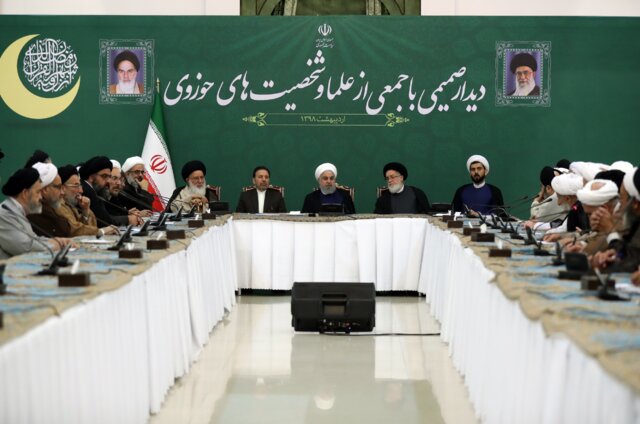
Iranian officials keep sending mixed messages of readiness to negotiate with the United States and preparedness to go to war, if necessary.
In the midst of escalating tensions between Iran and the United States, the Iranian President Hassan Rouhani says he is open to “negotiation and diplomacy” but not under the current conditions.
He added that during his trip to the US last year, five world leaders tried to mediate between him and the US President, adding that the year before that, the US Department of State requested for negotiation eight times.
Meanwhile, the Iranian Foreign Minister Mohammad Javad Zarif had an altercation with the US President on Twitter. Following a tweet by the US President Donald Trump in which he had threatened Iran, Zarif tweeted “genocidal taunts” would not “end Iran.”
Trump had tweeted “If Iran wants to fight, that will be the official end of Iran”, adding, “Never threaten the United States again!” This tweet was after a rocket landed near the US Embassy in Baghdad.
In reaction, Mohammad Javad Zarif tweeted that Iranians have stood tall for millennia while all the aggressors have gone. “Economic terrorism and genocidal taunts won’t end Iran,” tweeted Zarif. Mohammad Javad Zarif also addressed the US President saying, “Never threaten an Iranian. Try respect – it works!”
The IRGC Chief Commander, too, made remarks with regard to the recent tensions with the United States. Hossein Salami said Iran is not after war but is not frightened of war either adding, “the enemies lack the will to fight and are scared of war”.
Major General Salami continued: “All components of our defense power” are ready. He also emphasized that the IRGC has been able to “stop the enemy everywhere.”
ISNA
Tasnim
The Islamic Republic feeds on proxy wars and sabotage done by Shia militias
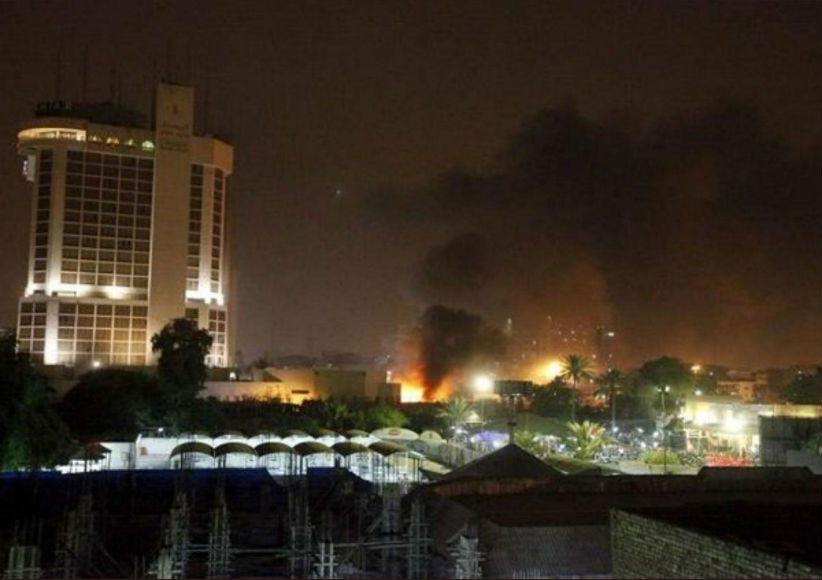
While some of Iran’s officials deny being involved in military tensions in the region, some other Iranian officials call the sabotage done by Shia militias a part of the “resistance” and “authority” of Iran against America and its allies.
On Sunday, two rockets landed near the US Embassy in Baghdad. America had earlier warned about the sabotage of Iranian-backed militias against the US interests and forces in the region. The US had taken its own unnecessary staff out of the US Embassy and consulate in Baghdad and Erbil to more secure areas. In addition, ExxonMobil Oil Company, too, took its own technicians and workers out of an oil field in Iraq.
In an initial reaction to the attack, the US President wrote in his Twitter account that if Iran wants to fight, that will be the end of Iran, urging that Iran must never threaten the United States again. Hours later in an interview with Fox News TV, he reiterated that he is not after a war with the Iranian regime but he will not allow them to have access to nuclear weapons.
Iran denies involvement in the recent terrorist attacks and sabotages, yet; some officials and domestic media agencies mention that these provocative measures as signs of the Iranian regime’s toughness against America and its allies. As such, Tehran has a dual policy with regard to the recent escalation of military tensions in the Middle East.
While Iran’s Foreign Ministry, some of its lawmakers, and its domestic media are in charge of denying involvement in sabotages and terrorist measures, some other lawmakers and media agencies propagandize the sabotages done by Iranian militias, considering them as a part of the resistance and the authority of the Islamic Republic. As such, the Iranian regime feeds on proxy conflicts.
Kayhan London
Iran quadruples its production of enriched uranium
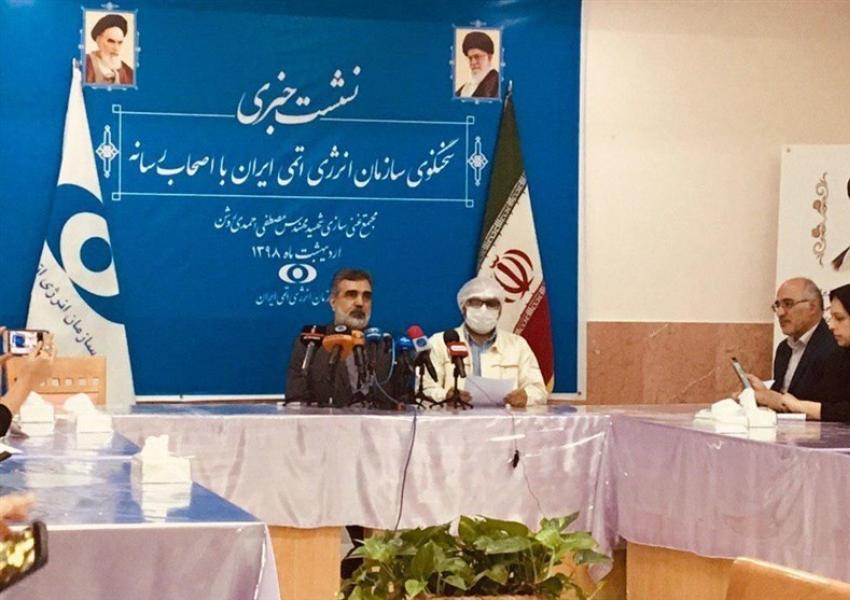
The Spokesperson of Iran’s Atomic Energy Organization Behrooz Kamalvandi announced a fourfold increase in production of 3.67% enriched uranium in Iran. This move doesn’t indicate an increase in the level of uranium enrichment or an increase in the number of centrifuges.
According to Kamalvandi, this increase has a “message for the other sides” in the JCPOA that Iran will soon pass the maximum limit of 300kg of 3.67% enriched uranium, which has been stipulated in the nuclear deal.
On the anniversary of the US pulling out of the nuclear deal on May 8, Iran announced halting some of its obligations under the JCPOA, giving a 60-day deadline to Britain, Germany, and France to provide for Iran’s economic interests. Otherwise, the Iranian President Hassan Rouhani has threatened that Iran will take two other steps and will no longer care for any limit in the level of enrichment.
Germany, Britain, and France, along with Federica Mogherini, the Representative of the European Union for Foreign Affairs, issued a statement on May 9, rejecting to abide by Iran’s deadline.
Increasing the amount of enriched uranium took place while according to the JCPOA, the stockpile of Iran’s enriched uranium must not be over 300kg. According to Kamalvandi, Iran’s stockpile will pass the limit of 300kg during next few weeks.
Iran International
Radio Farda
The Former President Mohammad Khatami: People won’t vote any more
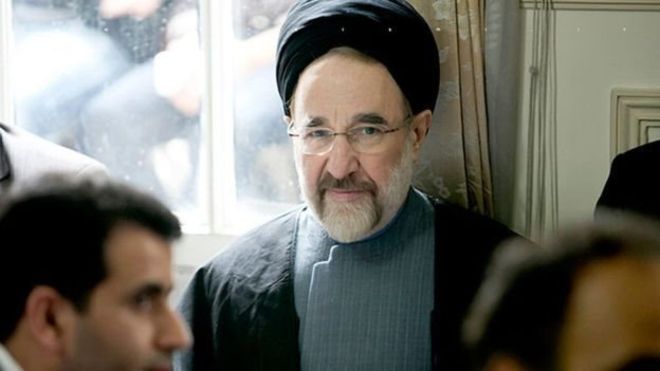
The doubts of the Iranian people about any improvement in the country’s conditions have risen so much that the former President Mohammad Khatami recently admitted that people would not go to the polls anymore, according to Mostafa Tajzadeh, a “reformist” politician close to Khatami.
Tajzadeh, in an interview with Hamshahri Daily, quoted Khatami as saying that people wouldn’t go to the polls, even if he, just like the previous elections, asked them to.
Tajzadeh was referring to Iran’s last parliamentary elections during which Khatami encouraged people to vote for the candidates backed by the “reformists”. At that time, the “reformists” offered two lists of candidates, known as “Omid [Hope] list”.
Referring to the “reformists’” efforts during the previous election, Tajzadeh asserted that the election was an opportunity for “survival”, but that would no longer work in the country’s current conditions and after the public protests in December 2017. “People want change, and if there is no change, most of them will not go to the ballot boxes,” stressed Tajzadeh.
People took to the streets in many cities in Iran in December 2017, protesting against the establishment. One of the major slogans chanted in the unrest was “Reformists, Principlists! The game is over.”
Iran’s next parliamentary elections will be held in less than 10 months.
BBC Persian
Basij official warns against infiltration of Marxist trends into universities
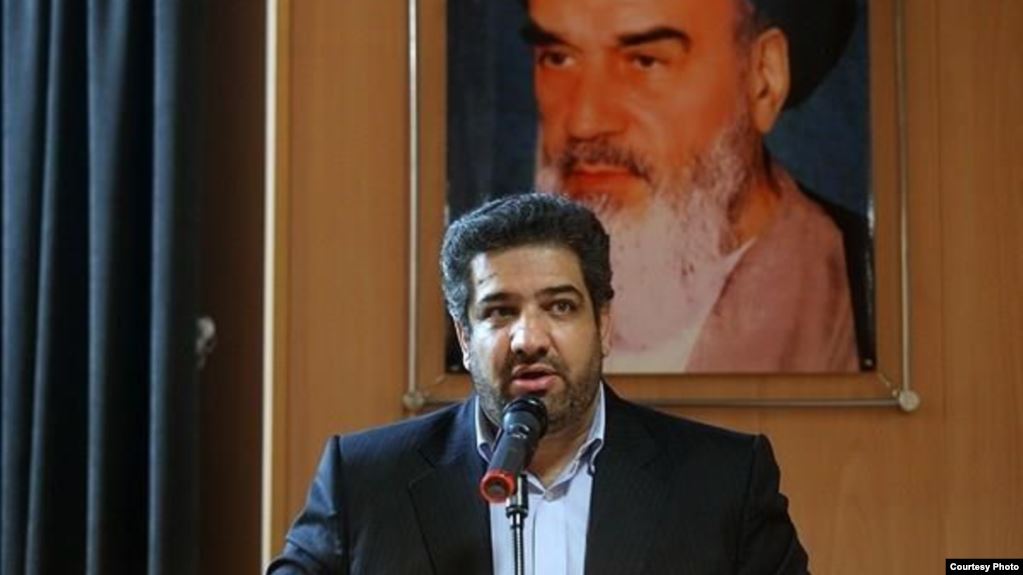
The Political Deputy of Tehran’s Basij, Rouhollah Solgi, has said Marxist trends have infiltrated into Iranian universities, adding such trends have been “planned in western think tanks.”
He made those comments after the recent protests against the compulsory hijab at Tehran University. The rally was held last week in protest against new regulations called “hijab and chastity plans.”
This Basij official said security organizations have a duty to identify key figures – who are only a few individuals – behind those protests.
Basij forces and plainclothed agents attacked the protest assembly of Tehran University students. Pictures and video clips published on social media showed how the Basij forces beat up students.
“Freedom of choice is our inalienable right”; “Students will die but won’t give in to oppression”; “Death to dictator”; and “People are begging, ‘Agha’ [the Master] is acting like God” were among the slogans chanted by students in their rally.
Rouhollah Solgi noted the assembly leaders chanted slogans in defense of workers while “they themselves belong to the Bourgeoisie and wealthy classes in society.” They “deceive the provincial students or those belonging to the lower class of society,” he asserted.
This is not the first time Iranian officials have warned against the infiltration of “leftists” at universities. Last year, Iran’s First Vice President Eshaq Jahangiri raised alarm against “leftist thoughts” in the country’s politics, calling it a “threat” for the private sector.
Radio Farda
